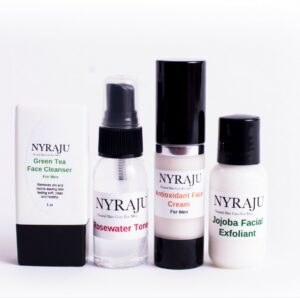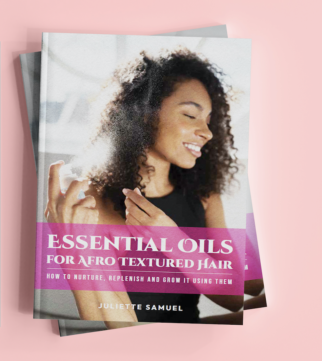 It is still a common perception: skin creams are for women; ‘real men’ don’t touch the stuff. The truth is, men have groomed their skin with lotions and potions for millennia. Natural black skin care products for men have a long history. From as early as 7000BC, Egyptians used the fatty oils from olives and sesame to make skin grooming products for men.
It is still a common perception: skin creams are for women; ‘real men’ don’t touch the stuff. The truth is, men have groomed their skin with lotions and potions for millennia. Natural black skin care products for men have a long history. From as early as 7000BC, Egyptians used the fatty oils from olives and sesame to make skin grooming products for men.
Today, men – particularly those between the ages of 25 and 50 – are definitely getting the message. Some people want to lump African American skin into a general “skin is skin” category. Your skin is different and it needs looking after.
The men’s grooming industry is booming – in 2016, it was set to bring in over $21 billion as men increasingly make use of beauty salon services.
It is good news to hear that men are investing in and caring for their skin. Their skin care needs are slightly different, however, because of variables between the skin of a man and that of a woman:
- The presence of androgen (testosterone) in men means that their skin is approximately 25% thicker than a woman’s. (In addition, a man’s skin texture is tougher.)
- Sebum (oil) and its production also differ because of these androgen secretions. Following puberty, males produce more oil than females – as a result, men tend to have longer lasting acne problems.
- Regardless of age, men have a higher collagen density than women. This is why, generally, men appear to age more slowly than women. (It has been said a woman’s skin is about 15 years older than that of a man’s of the same age.)
Typically, however, men – regardless of their race – do not derive the full benefits of these natural advantages, nor do they address skin problems as promptly, because they are less inclined to visit a dermatologist or research and use corrective skin care products. Further, if they can be persuaded to spend money on skin care products for men, most would only use a maximum of two products routinely, but we can still give some good advice, starting here with some skin care tips for black men.
- Black men, looking to take good care of their skin should consider that:Black skin is more prone to dryness or ashy-ness – especially on elbows and knees. Look for cleansing and moisturizing products, preferably without fragrance or alcohol, that contain coconut oil, shea butter, aloe or jojoba oil. Tempted to use a body moisturizer on your face? Generally, it’s not a good idea. Read the fine print and consider your skin type/condition. If your skin is sensitive or acne prone, use a separate, specially-formulated product for the face.
Avoid long, hot showers/baths – bathe in lukewarm temperatures and be mindful of the soap and shower gels you are using: some are over-fragranced and very drying. Never wash your face with hand soaps! They contain harsh detergents.
- Black men often suffer from dark spots or hyperpigmentation, either from acne or from shaving (bumps). Ideally, consult with a dermatologist before buying a treatment product – there are hundreds of over-the-counter products and you may not want to trawl through them. Ultimately, stay if you want to fade or remove hyperpigmentation, steer clear of hydroquinone products, unless prescribed by a doctor, and try gentler, safer formulations that contain kojic acid, alpha arbutin, bearberry extract and vitamin C.
- Black men invariably have curlier, C-shaped facial hair that can lead to a very painful and chronic in-grown hair problem on the face and throat. In-grown hair, in turn, may result in painful bumps and hyperpigmentation. Gentle exfoliation before each shaving session can help tremendously. (Try an exfoliator that contains fine glycolic microbeads, or even try a do-it-yourself exfoliator by mixing water and baking soda – but avoid any exfoliator that contains ground nuts!).
- If you can, shave directly after showering. The steam from the shower opens the pores, allowing them to relax. You’ll find the blade passes more smoothly over the skin, resulting in less irritation. In any event, be sure to use warm water when shaving and shave in the direction of the hair growth. When removing any in grown hairs, use a good pair of tweezers sterilized with surgical alcohol and go gently. Treat skin afterwards with a good moisturizer/serum formulated for the purpose. Change your shaving blades often to avoid transfer of bacteria to the skin.
- Use sun protection. Yes, you heard me. As black men your skin needs protecting, too. Depending on your climate, use a sunblock of at least SPF15, especially when venturing outdoors between the hours of 10pm and 2pm.
- Keep your towel on the rack! And change it often. Whether at home or in the gym, be mindful of where you are storing your towel(s). Sensitive, acne-prone skin needs vigilant care – if you can use a separate towel for drying your face, that’s even better.
- Eat a balanced diet and don’t smoke. Leafy greens, almonds, wild salmon, some red meat (the more organically-produced, the better) will not only make your skin more healthy, these foods will give you energy. Watch your beer and alcohol intake: alcohol contains a surprising amount of sugar, which leads to fat and premature wrinkling/aging.
There are, on the market, a number of excellent natural and organic skincare products for black men.
Try them! You’ll be glad that you did. That’s it for this week!
Here’s to great skin for our Black Men
Juliette Samuel
Esthetician/Author/Publisher




 Facebook
Facebook Twitter
Twitter Delicious
Delicious Digg
Digg Myspace
Myspace StumbleUpon
StumbleUpon Youtube
Youtube